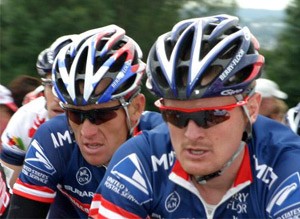 The US Postal Service cycling team is currently being scrutinised by federal investigators, with their conclusions expected to come at some time this season. Before then, ESPN has done some digging of its own, and it has uncovered both the costs of the sponsorship deal of the pro team, as well as also rules and responses to doping-related matters.
The US Postal Service cycling team is currently being scrutinised by federal investigators, with their conclusions expected to come at some time this season. Before then, ESPN has done some digging of its own, and it has uncovered both the costs of the sponsorship deal of the pro team, as well as also rules and responses to doping-related matters.
According to information contained in material sought and secured under a Freedom of Information Act request, the team spent $31.9 million to underwrite the USPS team between 2001 and 2004. This figure represented approximately 60 to 65 percent of the team’s total budget, with the remainder of the funding coming from other sources including secondary sponsors.
The spread of that total to the USPS cycling team’s management/holding company Tailwind has been laid out, with the team gaining $6.1 million in 2001, $7.61 million in 2002, $8.23 million in 2003 and $8.66 million in 2004. An additional total of $400,000 was provided for a junior programme, while approximately $700,000 was earmarked for what is termed ‘contract modifications.’
The US Postal Service is a government agency, and hence the current investigation is being carried out in a very thorough manner. If it is found that the team defrauded the sponsors by using banned substances or methods, those responsible could be liable to serious penalty.
However the sponsors were already concerned enough by the possibility of doping to introduce a ‘morals turpitude and drug clause’ back in 2000, which called for the suspension or firing of any rider who broke certain rules. An excerpt from the contract is as follows:
“The Company represents that each rider on the Team has a morals turpitude and drug clause that allows the Company to suspend or terminate the rider for cause which shall include items such as (1) conviction of a felony; (2) acts that require the Team to suspend or terminate the rider under the applicable rules of the Union Cycliste Internationale, the Federation Interationale du Cyclisme Professionel; the United States Professional Cycling Federation, Inc; the International Olympic Committee; the International Amateur Cycling Federation; the United States Cycling Federation and all other applicable governing organizations; (3) failure to pass drug or medical tests; (4) inappropriate drug conduct prejudicial to the Team, or the Postal Service, which is in violation of the Team rules or commonly accepted standards of morality; and (5) gross neglect of the rider’s duty.”
If any rider on the team is found guilty of such offense, the Company agrees to take appropriate action within (30) days.
In addition to that, the sponsors showed a growing unease in relation to stories from the 2000 Tour saying that medical trash dumped by the team contained suspicious waste. Actovegan was one substance found, but that investigation was eventually terminated two years later.
According to ESPN, USPS contracting officer Lynda Zelnick contacted Tailwind’s then managing director in February 2001 in order to warn him about, “the need for prudence and discretion in talking with the media.”
She told Allen Furst of “the Postal Service’s concern about the deleterious impact upon the anticipated value of our sponsorship.” She also told him that the agency was hiring a PR firm to control the handling of such things and that the $50,000 cost would be deducted from the overall sponsorship fee.
Investigators will look at this and other evidence to determine if the US Postal Service was defrauded or not. The investigation was partly sparked off by Floyd Landis’ allegations against the team in relation to what he said was widespread drug usage during his three years there.
Landis also filed a federal whistleblower lawsuit last spring, which the Department of Justice may or may not decide to put its weight behind.
Armstrong and others deny the claims. He is currently in Australia and will ride the Adelaide Cancer Council Classic on Sunday, then begin the Santos Tour Down Under on Tuesday. They are the final international events of his career.